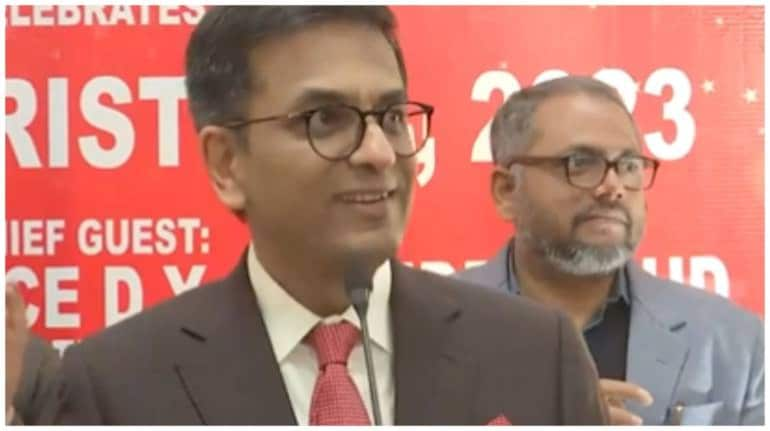



Chief Justice of India DY Chandrachud on January 28 asked the lawyers to "emerge out of adjournment culture" and move towards a culture of professionalism.
"In the near future, we must address the structural issues affecting the judiciary, such as pendency of cases, archaic procedures, and the culture of adjournments," the CJI said. He further called for a rethinking over long court vacations, saying, "Let us begin the conversation on long vacations and whether alternatives such as flexitime for lawyers and judges is possible."
The country's top judge made the above statements while delivering an address at the diamond jubilee celebrations of the apex court, marking the 75th year of the institution's establishment. He further urged the lawyers to ensure that the length of oral arguments does not delay the outcome of a case.
Furthermore, Chandrachud called for the bar to provide a "level playing field" for first-generation lawyers.
"The legal profession must provide a level playing field for first-generation lawyers – men, women and others from marginalised segments who have the will to work and the potential to succeed," he said.
Narishakti in judiciary
Chandrachud noted that the dynamics and gender gap in the judicial profession are narrowing now. He said "Traditionally, the legal profession was a profession of elite men. Times have changed. Women, traditionally underrepresented in the profession, now constitute 36.3 percent of the working strength of the district judiciary. "
The CJI stated that over 50 percent of the selected candidates for the post of junior civil judge in various states such as Andhra Pradesh, Arunachal Pradesh, Chhattisgarh, Delhi and others were women. He further said, "In the Supreme Court of India, we hire law clerks-cum-research associates to assist the judges, out of which 41 percent candidates are women this year."
He highlighted that till 2024, only 12 women were designated as senior advocates in the Supreme Court's history, however in 2024 a total of 11 women from various regions were conferred the designation.
Independence of judges' thought
Delivering his second address at the ceremonial bench of the Supreme Court to commemorate its inaugural sitting on January 28, 1950, the CJI spoke of the Constitution and the independence of judiciary.
He said, "The Constitution entrenches several institutional safeguards for an independent judiciary. However, these constitutional safeguards are not in themselves sufficient to ensure an independent judiciary."
The CJI noted that an independent judiciary does not merely mean functioning without interferences from the executive and the legislature branches, but also the independence of individual judges in the performance of their roles as judges.
He said, "The art of judging must be free of social and political pressure and from the inherent biases which human beings hold. Efforts are being made from within the institution to educate and sensitise judges across courts to unlearn their subconscious attitudes inculcated by social conditioning on gender, disability, race caste and sexuality."
Prime Minister Narendra Modi delivered the inaugural address at the celebration, where he announced the allocation of Rs 800 crore for the expansion of the Supreme Court Building Complex. Other dignitaries at the event include judges of the apex court, Union law minister Arjun Ram Meghwal, Attorney General Venkatramani and Solicitor General Tushar Mehta.
Discover the latest Business News, Sensex, and Nifty updates. Obtain Personal Finance insights, tax queries, and expert opinions on Moneycontrol or download the Moneycontrol App to stay updated!
Find the best of Al News in one place, specially curated for you every weekend.
Stay on top of the latest tech trends and biggest startup news.